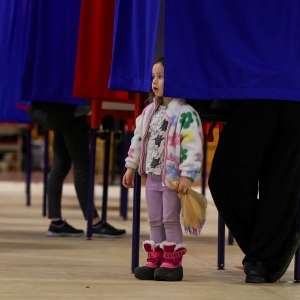Bill to prohibit racial profiling among police officers heads to governor’s desk
| Published: 06-05-2024 9:43 AM |
Rep. Charlotte DiLorenzo knows it as “the talk”: the conversation Black parents have with their children about how to respond if officers stop them or pull them over.
“Keep your hands visible, make no sudden movements, keep your mouth shut, be polite, and do not argue with the officer,” the Newmarket Democrat recalled to lawmakers last year.
And DiLorenzo has had to use those techniques. About three years ago, DiLorenzo, who is Black, was pulled over on her way to a grocery store, she testified. The officer was looking for a woman driving a red PT Cruiser; DiLorenzo was driving a red Prius and had been going the speed limit. She did not get an apology for the confusion, she said.
“I was upset, angry, and humiliated,” she said. “I was just minding my own business, and during those long moments, my whole view of the world had darkened.”
New Hampshire may soon have a law addressing the practice. A bill heading to Gov. Chris Sununu’s desk would formally prohibit police officers from profiling – and bar judges from factoring race or ethnicity into sentencing decisions.
But the bill, House Bill 596, does not include direct legal penalties for police officers or departments that violate it. Instead, advocates for the bill say the Police Standards and Training Council – which handles disciplinary proceedings against police officers – can use the bill as a guide for any enforcement action.
The legislation would be the first to define racial profiling in New Hampshire state statute. It describes it as “the practice of relying solely on race, ethnicity, color, national origin, nationality, language, sex, gender identity, sexual orientation, political affiliation, religion, socioeconomic status, or disability” in order for law enforcement to interview, detain, search, or stop a person.
Profiling would also include relying on any of those identifiers in “determining the scope, substance, or duration of investigation or law enforcement activity” against a person, according to the bill.
Article continues after...
Yesterday's Most Read Articles
 ‘There was no oversight’: NH child advocate has been a watchdog for children's care. Now, the office is on the chopping block
‘There was no oversight’: NH child advocate has been a watchdog for children's care. Now, the office is on the chopping block
 Volunteer group wants to help homeless clean up their camp
Volunteer group wants to help homeless clean up their camp
 ‘Less finger pointing, more communication’: Longtime Chichester residents share hopes before second town meeting
‘Less finger pointing, more communication’: Longtime Chichester residents share hopes before second town meeting
 Casella Waste Systems’ landfill project in New Hampshire’s North Country denied permit
Casella Waste Systems’ landfill project in New Hampshire’s North Country denied permit
 New Healthy Buffalo owner to build market in Chichester
New Healthy Buffalo owner to build market in Chichester
 ‘It’s everything’: In largest rally yet, Trump protestors descend on Concord
‘It’s everything’: In largest rally yet, Trump protestors descend on Concord
Rep. David Meuse, a Portsmouth Democrat and the sponsor of the bill, said in 2023 the bill does not include penalties to allow it to more easily pass the House and Senate. But he said the state’s Police Standards and Training Council has the power to discipline police officers in the state for cases of racial profiling.
The legislation comes three years after a state commission to improve policing in the wake of demonstrations around the murder of George Floyd – the Commission on Law Enforcement Accountability, Community and Transparency (LEACT) – recommended that New Hampshire bar racial profiling in law.
Currently, Section 242 of Title 18 in federal law makes it a crime for anyone “to willfully deprive a person of a right or privilege protected by the Constitution or laws of the United States.” That law is often interpreted as a bar on racial profiling. But Meuse said the requirement that the officers’ behavior be “willful” is, in practice, difficult to prove.
HB 596 does not include a requirement that police departments collect data on the racial makeup of police stops, as the LEACT commission also recommended. Meuse said police departments might face challenges in aligning to the same standard of data collection, and said it was something the Legislature might pursue in the future.
The bill would require that criminal sentences be “proportional to the nature of the crime committed,” and prohibit judges from making race or ethnicity a factor. And it would require the Department of Corrections to collect data on the race and ethnicity of any one serving a sentence of one year or more.
As of 2014, 30 states had laws that prohibit racial profiling in policing, according to an analysis that year by the NAACP.
The New Hampshire Association of Criminal Defense Lawyers has supported the bill. At a hearing in April 2023, Jeffrey Odland, the president of that association, argued the bill should also include data collection for police stops, noting that without that data, profiling patterns are difficult to prove.
“New Hampshire has always valued government transparency,” he said. “Sunlight is the best disinfectant.”
Rep. Linda Harriott-Gathright, a Nashua Democrat who is Black, says many Black residents have stories – in New Hampshire and beyond.
Harriott-Gathright’s grandsons frequently call to tell her about another police stop they don’t believe was justified. “It really does something internal to them, as well as me,” she said during a legislative hearing.
“Some people believe that we don’t have a problem in New Hampshire, but we really, truly do,” she said.







 Town elections offer preview of citizenship voting rules being considered nationwide
Town elections offer preview of citizenship voting rules being considered nationwide Medical aid in dying, education funding, transgender issues: What to look for in the State House this week
Medical aid in dying, education funding, transgender issues: What to look for in the State House this week On the Trail: Shaheen’s retirement sparks a competitive NH Senate race
On the Trail: Shaheen’s retirement sparks a competitive NH Senate race ‘If it affects one, it’s going to affect all’: Dozens protest federal firings in Concord
‘If it affects one, it’s going to affect all’: Dozens protest federal firings in Concord
